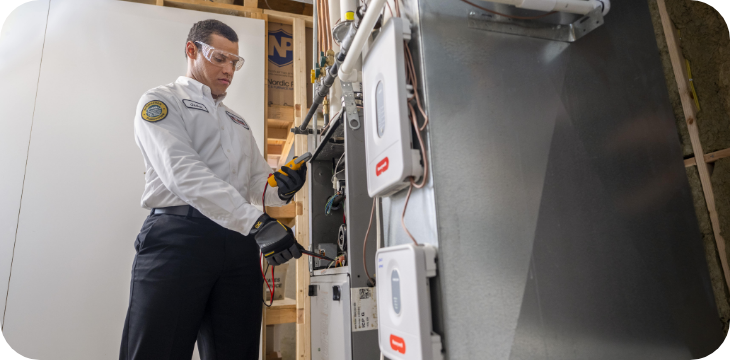Exactly How to Select the Right Heating And Cooling System for Your Needs
Selecting the appropriate cooling and heating system is a critical choice that calls for cautious consideration of various factors. Begin by reviewing your home's size, design, and distinct requirements, as these components determine the required capacity and arrangement of the system. Furthermore, establishing a spending plan that includes installation and lasting operational prices is crucial. As you evaluate your options, recognizing energy performance scores and the implications of your neighborhood climate will certainly play a considerable duty in your option. However, the myriad of system kinds available can complicate this process, leading one to question which path eventually leads to ideal comfort and effectiveness.
Analyze Your Home Size
Evaluating your home dimension is a crucial initial action in choosing the ideal Cooling and heating system. A Heating and cooling system that is too small will battle to keep comfy temperature levels, leading to boosted power usage and wear on the unit.
To precisely analyze your home size, gauge the square footage of each room, thinking about aspects such as ceiling height and the design. Additionally, consider the insulation top quality and the variety of windows, as these elements affect thermal efficiency. Houses with open layout might need different system setups contrasted to those with numerous divided rooms.
Using the Manual J lots estimation technique can provide an extra exact quote of your HVAC requires. This technique accounts for different factors, consisting of regional climate, solar gain, and tenancy patterns. By thoroughly evaluating these facets, you can guarantee that your picked a/c system is appropriately sized, bring about improved convenience, energy performance, and durability of the tools.
Determine Your Budget Plan
Establishing your budget plan is a crucial action in the HVAC system choice procedure, as it sets the criteria for your options - DMAKS HVAC. A cooling and heating system is a considerable financial investment, and understanding your monetary restrictions will aid tighten down options that fit within your methods
Begin by assessing not only the first purchase cost yet also setup expenses, which can differ considerably relying on the intricacy of the project. Moreover, take into consideration ongoing costs such as upkeep, repairs, and energy usage. A system might appear budget friendly initially but can result in greater expenses with time if it is much less efficient.
It is advisable to assign a contingency fund for unforeseen costs that might develop throughout installment or first system changes (DMAKS HVAC). In addition, discover funding alternatives or rebates that might be readily available, as these can ease the burden of upfront costs
Ultimately, having a clear budget plan enables you to engage with a/c specialists better, ensuring you get tailored guidance that lines up with your economic objectives and home requirements. By being attentive concerning your spending plan, you can make informed decisions that boost comfort without compromising economic security.
Evaluate Power Performance
Energy effectiveness plays an important function in the overall performance and cost-effectiveness of your HVAC system. When choosing a system, it is try this out necessary to consider its power efficiency scores, as these numbers directly affect your energy bills and environmental impact. Look for systems with a high Seasonal Energy Performance Proportion (SEER) for cooling and a high Annual Gas Usage Effectiveness (AFUE) ranking for heating. Higher Web Site scores show greater effectiveness, indicating even more comfort for less energy usage.
Furthermore, think about the Power Celebrity qualification, which signifies that the system meets strict effectiveness guidelines set by the Environmental Security Company. Spending in a Power Star-rated a/c system can bring about substantial financial savings with time, specifically in locations with severe temperature level changes.
One more aspect to examine is the system's size and capability. An oversized or undersized unit can lead to inadequacy and raised power expenses. DMAKS HVAC. Appropriate sizing, typically figured out with a Manual J load estimation, makes certain that the system runs at ideal efficiency


Consider Environment and Atmosphere
When selecting an a/c system, it is vital to take into consideration the regional environment and environmental conditions, as these variables significantly influence the system's performance and efficiency. Different regions experience varying temperature extremes, moisture degrees, and seasonal adjustments, every one of which influence home heating and cooling demands.

Moreover, regional ecological factors, such as air high quality and potential allergens, must educate your choice. Equipments furnished with advanced filtering modern technologies can help alleviate toxins and provide cleaner air. Furthermore, take into consideration the energy sources readily available in your location-- some heating and cooling systems are a lot more reliable when powered by gas or eco-friendly power sources.
Eventually, aligning your heating and cooling system selection with your regional climate and ecological considerations will lead to enhanced comfort, boosted effectiveness, and lower energy costs.
Explore System Kind and Functions
As house owners look for to maximize comfort and effectiveness, exploring the different sorts of HVAC systems and their special features becomes important. The primary kinds of HVAC systems include central air, heatpump, ductless mini-split systems, and heating systems. Each system provides unique benefits tailored to different requirements and preferences.
Central air conditioning systems give uniform air conditioning throughout a home, making them suitable for larger rooms. Warm pumps work as both home heating and cooling solutions, using electrical energy to transfer warmth, which can result in lower energy expenses. Ductless mini-split systems are becoming significantly preferred due to their flexibility and simplicity of installment, allowing home owners to regulate the temperature in individual areas without considerable ductwork.

Verdict
In conclusion, selecting the suitable a/c system requires mindful factor to consider of numerous variables, including home size, budget constraints, energy effectiveness, regional environment, and offered system kinds. A complete assessment of these elements guarantees ideal convenience and cost-effectiveness. By adhering to an organized technique, home owners can make informed decisions that align with their particular demands and choices, eventually bring about improved interior air top quality and power savings.